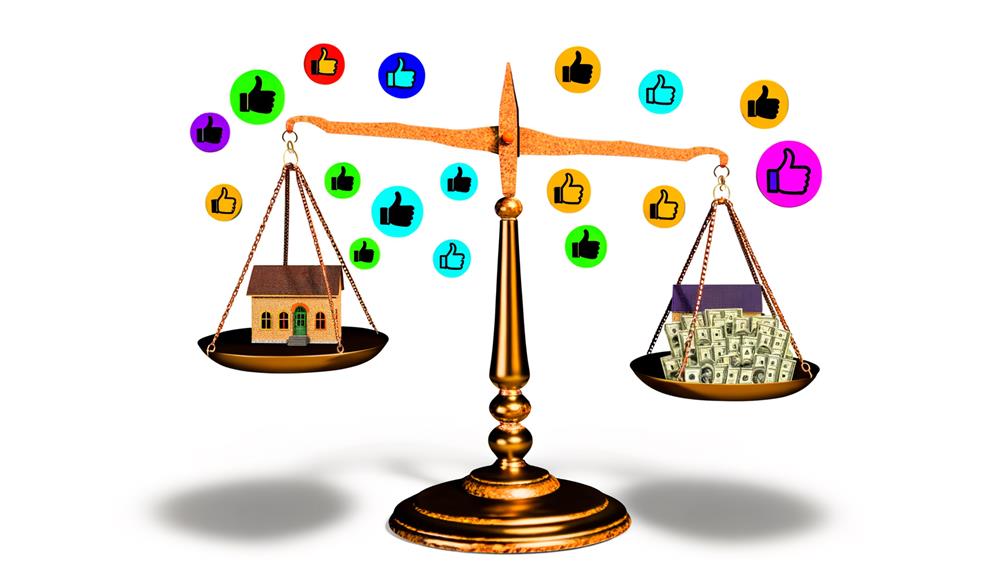The transaction dynamics between cash buyers and homeowners in the real estate market is an area that warrants thorough deliberation. Although cash buyers are often perceived as opportunists who capitalize on the urgency or desperation of sellers, it is crucial to understand their modus operandi and the factors that influence their offer for a property.
This comprehensive understanding is instrumental in establishing a mutually beneficial relationship in the transaction process. Therefore, the question arises, how much do cash buyers truly pay for houses? And what variables come into play when they determine their offer?
As we unpack this topic, we aim to shed light on these questions and unravel the intricacies of cash home buying.
Key Takeaways
- Cash buyers determine the value of a home based on factors such as location, size, age, and unique features.
- Selling to cash buyers may result in a lower offer compared to traditional market sales.
- Cash buyers provide convenience, speed, and flexibility in the closing process.
- Offers from cash buyers are influenced by factors like after repair value, fixed overhead costs, repair expenses, wholesaler fee, and profit margin.
Understanding Cash Buyer's Market
In examining the cash buyer's market, it is crucial to delve into the methods these buyers use to determine the value of a home, which includes a comprehensive analysis of various factors such as location, size, age, and unique features of the property, in contrast to the reliance on online home valuation tools.
Cash buyers, including cash wholesalers, home flippers, and rental house cash buyers, employ a meticulous process of assessing fair market value. These buyers, often a lifeline for those who need to sell their house quickly, utilize comparable properties (comps) that have sold within the last three months in the same neighborhood. This detailed study of the real estate market ensures that the cash offer within is reasonably accurate and reflective of the house's estimated value.
However, it is pertinent to note that although selling to cash buyers provides convenience, speed, and flexibility, the cash offer may be lower than traditional market sales. This is a trade-off against the quick closing process and other perks offered by house cash buyers. Therefore, understanding the dynamics of this market is critical for a homeowner to make an informed decision.
Factors Influencing Cash Offers
While the allure of a swift and straightforward process entices many sellers to consider cash offers, it's crucial to understand the multiple factors that influence these offers, ranging from the home's location, size, and age to the current state of the real estate market.
Real estate investors such as cash home buyers or Companies That Buy Houses evaluate these key aspects meticulously before making an offer.
Notably, cash home buyers don't solely rely on online valuation tools. Instead, they utilize comparable sales, also known as comps, of similar homes sold within the neighborhood in the last three months. This analytical approach allows them to accurately gauge the value of a property, taking into account unique features of the home.
The type of cash buyer also significantly impacts the offer. Wholesalers, home flippers, and rental home cash buyers calculate offers based on different factors. These include the after repair value, fixed overhead costs, anticipated repair expenses, wholesaler fee, and expected profit margin.
Therefore, home sellers intending to sell their house for cash must consider these elements to understand the potential value of their property in the eyes of cash buyers.
Types of Cash Home Buyers

Cash home buyers can be categorized into distinct types, each with unique strategies, objectives, and methods of calculating offers. The types of cash home buyers usually include house flippers, rental property investors, and home buying companies.
House flippers aim to buy homes below market value, renovate them, and sell for a profit. They calculate their offer for your home considering the potential resale value and the cost of repairs needed.
Rental property investors, on the other hand, buy houses to transform them into income-generating rentals. Their offer usually reflects the expected rental income.
Home buying companies, the third type, are companies that buy homes to resell them. These cash buyers purchase homes directly and offer cash for your home quickly, often within days.
When you decide to sell to a cash homebuyer, understanding these types can help you negotiate a better deal. Here's a quick summary:
| Cash Home Buyer Type | Strategy | Offer Calculation |
|---|---|---|
| House Flippers | Resell after renovation | Potential resale value minus repair costs |
| Rental Investors | Transform into rentals | Expected rental income |
| Home Buying Companies | Resell directly | Various factors including location, condition, market trends |
Evaluating Cash Offers
When it comes to evaluating cash offers for your home, a detailed understanding and careful analysis of each proposal are paramount to ensure you secure the best possible deal. This process is a necessary part of the real estate landscape, especially when dealing with cash buyers, who usually pay directly for homes without the need for mortgage financing.
To effectively evaluate cash offers, consider the following:
- Comprehend the Offer: Understand the details of the offer, including the price, contingencies, and whether the buyer will Pay Closing Costs.
- Compare Offers: If multiple offers are on the table, compare them to identify the most beneficial one.
- Verify Buyer's Credibility: Check the credibility of the buyer. Texas cash buyers, for instance, should have a solid reputation in the market.
- Consider the Market Condition: The state of the real estate market can influence the attractiveness of cash offers.
Evaluating cash offers is crucial to maximizing the financial returns from your house sale. Be analytical, detailed, and knowledgeable in your approach to secure a deal that aligns with your needs and desires.
Pros and Cons of Cash Sales

Having evaluated the dynamics of cash offers, it is imperative to further scrutinize the implications of cash sales by considering their potential advantages and drawbacks. One of the evident benefits of cash sales is the rapid and hassle-free transaction that companies that buy homes can offer. Home buyers in Houston and similar markets often close within a week, embodying the 'sell my house fast' appeal of cash offers.
However, selling your home for cash may not always yield the best cash offer. Cash buyers, due to their immediate liquidity, often propose lower prices compared to the open market. This could result in lower net profits for sellers opting for cash for homes.
| Pros | Cons |
|---|---|
| Quick closing date | Lower net profits |
| No need for house preparations | Due diligence required |
| No financing uncertainty | Limited buyer pool |
| No appraisal delays | Lower offer prices |
In essence, the decision to sell a house for cash should be well-considered, weighing the pros and cons. It is a trade-off between the convenience and speed of cash sales and the potential for higher profits in traditional market sales.
Frequently Asked Questions
How Much Less Should You Offer on a House When Paying Cash?
When making a cash offer on a house, offering strategies suggest bidding 5-20% less. This is influenced by market trends, property condition, and the seller's perspective. Legal considerations and negotiation tactics also play a role.
Does It Ever Make Sense to Buy a House With Cash?
Buying a house with cash can offer financial freedom and security by eliminating a mortgage, however, it can limit asset liquidity. It's a strategic decision depending on personal finances, real estate market, and tax implications.
Is It Good to Be a Cash Buyer?
Being a cash buyer provides advantages like financing freedom, speedy transactions, and negotiation power. However, it also involves risks such as market fluctuations. Despite potential challenges, the investment potential often outweighs the risks for many cash buyers.
How to Negotiate Buying a House With Cash?
Negotiating a cash house purchase involves understanding seller motivations, market conditions, and property evaluations. Employ negotiation strategies like comparative analysis, legal considerations, and contingency planning, while leveraging cash advantages and potential inspection waivers for expedited closing timelines.
Conclusion
In conclusion, the amount cash buyers pay for houses is influenced by a myriad of factors. These factors include the real estate market conditions, location, size, age, and condition of the property. Cash sales, while offering a quick, hassle-free transaction, may result in lower sales prices.
It is crucial for homeowners to meticulously evaluate cash offers. They should weigh the benefits and drawbacks of accepting a cash offer. By doing so, homeowners can ensure that they achieve the best financial outcome.


